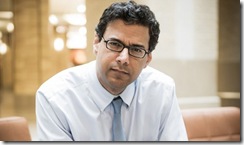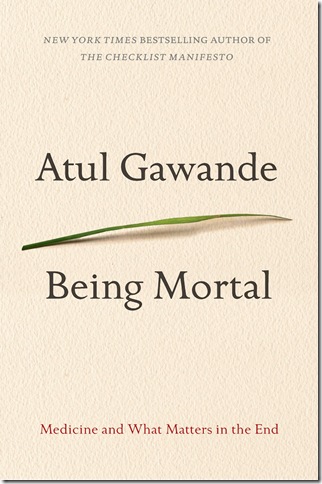Modern medicine excels at treating illness while it mostly sidesteps patients’ end-of-life fears and hopes, which is the theme of Being Mortal, a thoughtful new book by Harvard University surgeon and author Atul Gawande.
“I learned a lot of things in medical school, but mortality wasn’t one of them,” Gawande writes. “Our textbooks had almost nothing on aging or frailty or dying.”
Gawande, who is 49, says many doctors purposely avoid elderly patients. The number of geriatric specialists has fallen, scores of hospitals have closed or shrunk their geriatric units, and 97 percent of medical students do not take a single course in this specialty.
Reading story after story of physical and mental decline in advancing years can be depressing. Forty percent of those who reach age 85 will suffer from dementia.
The book’s dominant message is that doctors can be tone-deaf when treating sick, elderly patients. Physicians recommend aggressive treatments for cancer, heart disease and other serious ailments, even when there is little chance these interventions will extend a patient’s life. And radical surgery often causes more pain and suffering.
“The waning days of our lives are given over to treatments that addle our brains and sap our bodies for a sliver’s chance of benefit,” Gawande writes.
For most of history, those with serious afflictions died within days, usually quietly at home. Today, death most often comes after a long struggle with cancer, dementia, organ failure or the debilities of old age. Patients live with declining health for years.
Gawande explains the turning points in history that led to the current situation, in which “medical professionals concentrate on repair of health, not sustenance of the soul.”
Early in the last century, the elderly sick were moved into hospitals. By the 1950s, hospitals began building separate facilities, referred to as nursing homes, for those patients. That was followed by assisted living, which was designed to give patients more privacy and freedom.
Gawande cites a number of facilities that have embraced common-sense reform. In 1991, a young doctor named Bill Thomas became the medical director of a nursing home in upstate New York. Young quickly identified what he termed the “three plagues” of nursing home life: boredom, loneliness and helplessness.
He brought in dogs, cats, parakeets, rabbits and indoor plants, despite staff resistance. Each resident adopted and named a parakeet. Patients responded with enthusiasm, and their use of psychotropic drugs plummeted.
Research shows that people generally become happier as they age. Ambition, acquisition and long-term goals fade. Instead, “people want to share memories, pass on wisdoms and keepsakes, settle relationships, establish their legacies, make peace with God, and ensure that those who are left behind will be okay.”
 Physicians avoid end-of-life conversations and, as a result, are ignorant about patients’ concerns and needs.
Physicians avoid end-of-life conversations and, as a result, are ignorant about patients’ concerns and needs.
Gawande, who writes for The New Yorker, where some of this material first appeared, tells several end-of-life stories, including a moving account of his father’s experiences following the diagnosis of a tumor in his spinal cord. Eventually, Gawande’s father, also a surgeon, declined further intervention and was moved into hospice, where he died peacefully after visits with his family.
His death was part of “a monumental transformation” in end-of-life care. As of 2010, some 45 percent of Americans died in hospice.
Another transformation also is taking place. A century ago, 65 percent of Americans age 65 and older lived with their children. By 1975, that figure had dropped to 15 percent, as more children sought independence and rejected the demanding responsibility of caring for an elderly parent at home.
One study shows patients who talked to a palliative-care specialist stopped chemotherapy sooner, entered hospice earlier, experienced less suffering and lived 21 percent longer.
Perhaps the overall message from this timely primer is that the final years of life must balance medicine, patient preferences and family needs.
Being Mortal: Medicine and What Matters in the End, by Atul Gawande; Metropolitan Books, 282 pages, $26.
Bill Williams is a freelance writer in West Hartford, Conn., former editorial writer for The Hartford Courant and member of the National Book Critics Circle. Williams can be reached at billwaw@comcast.net.
